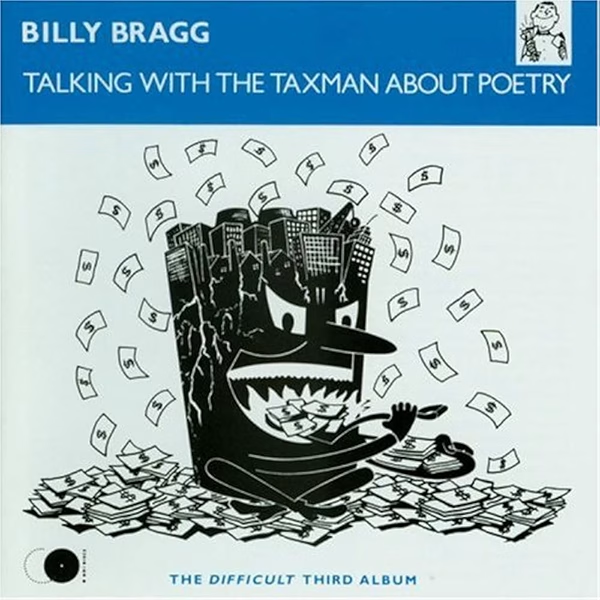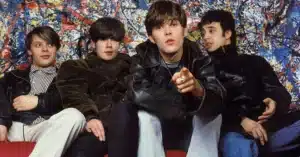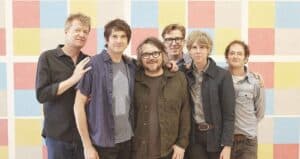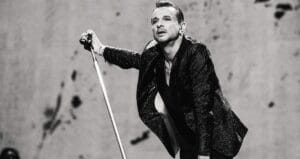Billy Bragg: The Bard of Barking and Voice of the People
Billy Bragg is a British singer-songwriter and activist, known for blending folk, punk, and protest music into a body of work that is both politically engaged and deeply personal. Emerging from the UK’s post-punk scene in the early 1980s, Bragg forged a unique identity: a one-man band with a guitar, a sharp tongue, and a heart on his sleeve.
With a sound often built around just his voice and a jangly electric guitar, Bragg became a working-class hero, singing about love, labor, justice, and hope with rare honesty and wit. His songs walk the line between intimate confession and public manifesto, making him one of the most distinctive and enduring voices in British music.
Billy Bragg. Early Life and Career
- Full Name: Stephen William Bragg
- Born: December 20, 1957, Barking, Essex, England
- Inspired by both punk rock and folk traditions, particularly The Clash, Woody Guthrie, and Bob Dylan
- Began his career with the punk band Riff Raff, before launching a solo project under the name Billy Bragg
Billy Bragg. Musical Style and Themes
Bragg’s music is defined by:
- Stripped-down arrangements – often just guitar and voice
- Direct, conversational lyrics – both political and romantic
- Socialist and anti-fascist messaging
- Romantic sincerity and working-class storytelling
- A blend of folk balladry, punk urgency, and British realism
His vocal delivery is raw and authentic, often conversational, allowing his lyrics to take center stage.
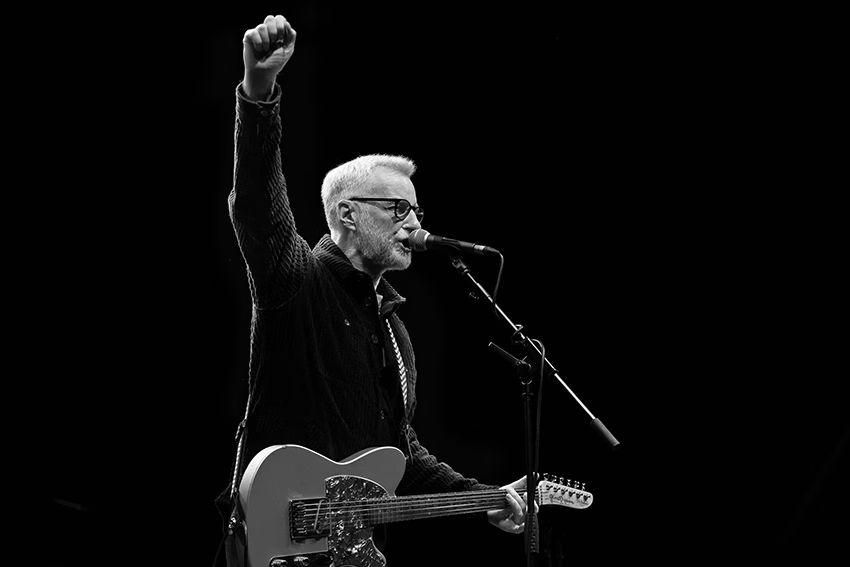
Billy Bragg. Key Albums
Life’s a Riot with Spy vs. Spy (1983)
His debut mini-album—just 17 minutes long—delivered seven urgent, poetic punk-folk songs.
Highlights:
- “A New England” – His breakthrough single (later a hit for Kirsty MacColl)
- “The Milkman of Human Kindness”
- “To Have and to Have Not”
Brewing Up with Billy Bragg (1984)
More polished but still minimalist, this record mixes love songs with scathing political commentary.
Highlights:
- “It Says Here” – A sharp critique of the media
- “Love Gets Dangerous”
- “Island of No Return”
Talking with the Taxman About Poetry (1986)
His first full-length album. A fuller production, deeper songwriting, and more varied instrumentation.
Highlights:
- “Levi Stubbs’ Tears” – A moving tale of strength and survival
- “Greetings to the New Brunette”
- “There Is Power in a Union”
Workers Playtime (1988)
Produced by Joe Boyd, this album marked a shift to more romantic and personal themes, with a more melodic sound.
Highlights:
- “She’s Got a New Spell”
- “Valentine’s Day Is Over”
- “The Short Answer”
Don’t Try This at Home (1991)
A collaborative, more radio-friendly album featuring Johnny Marr (The Smiths), and others. Balanced politics and pop sensibility.
Highlights:
- “Sexuality” – A witty, inclusive anthem
- “You Woke Up My Neighbourhood”
- “Accident Waiting to Happen”
Mermaid Avenue (1998, with Wilco)
A groundbreaking collaboration where Bragg and Wilco set unreleased Woody Guthrie lyrics to music. A timeless tribute to folk’s radical spirit.
Highlights:
- “California Stars”
- “Way Over Yonder in the Minor Key”
- “Ingrid Bergman”
(Also see Mermaid Avenue Vol. II and Vol. III)
England, Half English (2002)
A politically charged album addressing multiculturalism, identity, and British nationalism.
Highlights:
- “Take Down the Union Jack”
- “St. Monday”
Tooth & Nail (2013)
A mellow, Americana-tinged collection. Less overtly political, more meditative and personal.
Highlights:
- “Handyman Blues”
- “January Song”
- “No One Knows Nothing Anymore”
The Million Things That Never Happened (2021)
An album shaped by pandemic-era reflection. Subtle, stripped-back, and philosophical.
Highlights:
- “Mid-Century Modern”
- “Freedom Doesn’t Come for Free”
Activism and Influence
- A longtime champion of social justice, trade union rights, anti-fascism, and electoral reform
- Founded the Jail Guitar Doors initiative (with Wayne Kramer), helping provide instruments to prisoners
- A prominent voice in the Red Wedge movement during the Thatcher years, using music to promote left-wing politics
- Advocated for Scottish independence, refugee rights, and British democracy
Bragg has always used his platform not just to entertain, but to educate and empower.
Collaborations and Covers
- Worked with Wilco, Natalie Merchant, Johnny Marr, Florence Welch, and The Blokes
- His cover of “The Internationale” remains a stirring leftist anthem
- Known for blending Woody Guthrie’s populism with punk’s rebellion
Billy Bragg. Legacy
- One of Britain’s most respected and articulate protest singers
- Bridged the gap between punk politics and folk tradition
- A profound influence on artists like Frank Turner, Jamie T, Beans on Toast, and The Levellers
- Continues to tour, record, and speak out—as relevant today as ever
Where to Start
| Album | Year | Best For |
|---|---|---|
| Life’s a Riot with Spy vs. Spy | 1983 | Raw, urgent protest folk |
| Talking with the Taxman About Poetry | 1986 | Political and poetic balance |
| Don’t Try This at Home | 1991 | Accessible and melodic |
| Mermaid Avenue | 1998 | Folk revival with timeless appeal |
| Tooth & Nail | 2013 | Reflective and beautifully restrained |
Final Thoughts
Billy Bragg is more than a singer—he’s a storyteller, agitator, romantic, and educator. Whether singing about a broken heart or a broken system, he does so with clarity, compassion, and conviction. With just a voice and a guitar, he has moved audiences for decades, proving that truth can be poetic, and change can be melodic.
If you’re looking for songs that both challenge your mind and touch your soul, Billy Bragg is your man.
External Links


